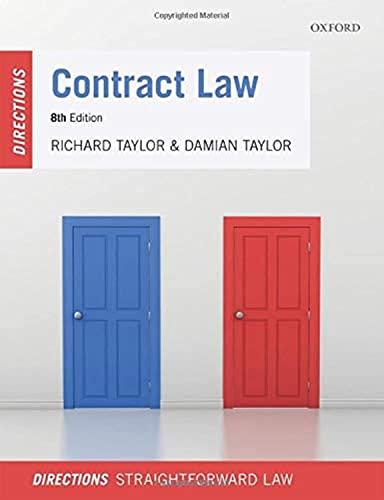Answered step by step
Verified Expert Solution
Question
1 Approved Answer
Obligations and benefits under a contract are confined to the parties to the contract; this is the principle called _________________( 2 words ) The ________________
- Obligations and benefits under a contract are confined to the parties to the contract; this is the principle called _________________(2 words)
- The ________________ is breachedwhen someone does or does NOT do something that an average person would have (have not) done in a similar circumstance.
- _________________ (2 words) is the legal concept applied whenacompany is held responsible for harm caused by its employees in the course of employment.(2 words)
- _________________ is a form of breach of contract consisting in the declaration of one party to NOT comply the performance required.
- An _________________ tort occurs when a person knows the consequences of his/her actions and wants them to happen
According to the Law of Contracts:
- It is not considered necessary that the contract be in writing, with some exceptions.
- Even if a contract is illegal, the parties can seek a remedy through the Court system.
- A contract made by a minor is considered void with no exceptions.
Which of the following is NOT a main element of Negligence:
- Breach of the duty of care
- Injury resulting from the breach
- Fraudulent misrepresentation
- Proximate cause of the injury by the breach
According tothe doctrine of vicarious liability:
- Employers are responsible for the actions of their employees while they are on the job.
- Employees cannot be held accountable for their actions if they don't have a regular contract.
- Employers are responsible for the actions of their employees and their guests while they are in the business premises.
- Employees are not responsible for their actions if they have received a proper training.
The doctrine of the Thin Skull Rule dictates that:
- The defendant who was not able to reasonably anticipate an injury as a consequence of his/her conduct may be held accountable in Court only if the plaintiff contributed to the cause of his/her injury.
- The tortfeasor who can reasonably foresee some injury because of his/her conduct may not be liable for more serious consequences than he/she anticipated.
- The tortfeasor who can reasonably foresee some injury because of his/her conduct may be liable for more serious consequences than he/she anticipated.
A restaurant menu is an example of the offer element of a contract:
- False
- True, except for restaurants with liquor license.
- True, except for restaurants without liquor licence.
Step by Step Solution
There are 3 Steps involved in it
Step: 1

Get Instant Access to Expert-Tailored Solutions
See step-by-step solutions with expert insights and AI powered tools for academic success
Step: 2

Step: 3

Ace Your Homework with AI
Get the answers you need in no time with our AI-driven, step-by-step assistance
Get Started


